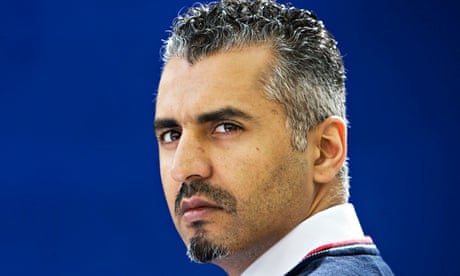The real scandal in the Liberal Democrats is not leading the news. Extremists are menacing the career and life of a Liberal Democrat politician and respectable society hardly considers these authentically scandalous threats to be a scandal at all. The scandal, in short, is that there is no scandal.
The reasons for the attacks on Maajid Nawaz are so bland, it makes me yearn to live in a grown-up country where I could shrug them off. But we don't live in a grown-up country and I had better explain. The BBC asked the executive director of the Quilliam Foundation, an anti-extremist thinktank, on to a discussion show. Two atheist members of the audience wore T-shirts showing Jesus saying: "Hey" and Muhammad saying: "How ya doing?" I beg you to keep the innocuous nature of the cartoon at the front of your mind as we descend into a modern Bedlam.
The BBC decided that extreme Wahhabi and Salafi Muslims, who would ban all images of Muhammad, represented all Muslims. It ordered its producers not to show the offending T-shirts. Nawaz left the studio in some disgust. He tweeted the cartoon of Jesus saying: "Hey" and Muhammad saying: "How ya doing?" and added: "This is not offensive & I'm sure God is greater than to feel threatened by it." God may not have felt threatened, but his supporters did. A Liberal Democrat activist called Muhammad Shafiq took it upon himself to organise a national and international campaign against Nawaz.
At the time we went to press, about 20,000 people had signed Shafiq's petition to Nick Clegg, saying that the tweet had caused an "extreme amount of insult, hurt and anguish". The Lib Dems must stop Nawaz standing as their candidate in Hampstead and Kilburn at the next general election, they demanded.
Nawaz told his critics he had merely said that he did not think the BBC should censor a mild cartoon. He then went to the core of what is wrong with extremist religion and Britain's thoughtless multiculturalism which, in the name of "diversity", spatchcock people into ethnic and religious blocks that deny their individuality. If you want to ban inoffensive images of the prophet, Nawaz said, then I am sorry, I am not that type of literalist Muslim.
In other words, neither "community leaders" nor multicultural bureaucrats could talk of "the Muslim community" whose taboos must be observed. There were many "Muslim communities" and ex-Muslims, too, and they should be free to argue without fear.
Shafiq denies that he is spreading fear and if you had not done the research you might believe him. Certainly, you could think him a man who can snuffle out offence where no one else can find it. You could think that the 20,000 or so who have signed his petition are so desperate for reasons to censor that they will manufacture them. But this is a free country and they are entitled to their hysterias.
But to put it as politely as I can, Shafiq is not your standard Liberal Democrat. He is in charge of the Ramadhan Foundation, which has hosted speakers whose attitudes towards gay people and Jews are anything but liberal. To make sure that Nawaz felt the full force of his critique, Shafiq slipped an aside into his open letter to Nick Clegg. He talked of Nawaz's "expected, suspected, wanted reaction from the minority of unhinged in those communities". Nawaz was deliberately soliciting attacks from the "unhinged", apparently. He expected them. He wanted them. And if the unhinged should assault or kill him – he had no one to blame but himself. Shafiq told me that he did not mean that Nawaz was inciting his own murder, but I struggle see how else his followers can interpret his words.
On Twitter, Shafiq went further and gave a masterclass in double speak. "Ghustaki Rasool Quilliam," he tweeted. Most of his audience had no idea what he meant. A few knew all too well. "Ghustaki Rasool" is "defamer of the prophet" in Urdu: a charge that incites Islamists to murder. Fanatics took to Twitter to prove the point. "Have spoken to someone in Pakistan," one of Shafiq's followers replied. "They will have a surprise for him on his next visit!" Another Twitter user contacted Nawaz to say: "Gustak e rasool is punishable by death anywhere in the world. Btw I'm in the UK not Pakistan." A third cried that "dogs like Maajid Nawaaz will be punished!"
In the last decade, we tried to speak of the "Danish cartoons crisis" without choking on the absurdity of our words. You will remember that the Assad regime, the Iranian mullahs and the Mubarak regime in Egypt incited enmity against Denmark to distract their subject populations from authoritarian rule at home. We may have to move from the plural to the singular and speak of a British "cartoon crisis" soon. Safiq told Twitter: "We will notify all Muslim organisations in the UK of his despicable behaviour and also notify Islamic countries."
I should declare an interest and say that I know and respect Maajid Nawaz, not least because the great conflicts of our time have run through his life. If you doubt me, read his autobiography, Radical, which describes how the Serbs' massacre of Bosnian Muslims drove him into Hizb ut-Tahrir and then an Egyptian jail.
The support of the "infidels" at Amnesty International, whose campaigns saved him from torture in Egypt, made him realise that liberalism was preferable to global jihad. At the Quilliam Foundation, he campaigns against the white far right and the religious far right. His work reached a culmination when Nawaz left the English Defence League leaderless and directionless by persuading Tommy Robinson to abandon his old friends.
The campaign against him is now a test for the Liberal Democrat leadership. It should defend freedom of speech in all cases except when speakers espouse violence. If Clegg cannot say that a polite protest against the cowardice of the BBC does not justify death threats, he will lose the right to call himself a liberal. I am glad to say his local party in Hampstead and Kilburn has backed Nawaz already. I hope that come the next election all Hampstead voters of all persuasions will consider voting for him.
Some arguments matter more than party politics. The right of democratic representatives and democratic publics to speak their minds without fear of retribution is one of them.

